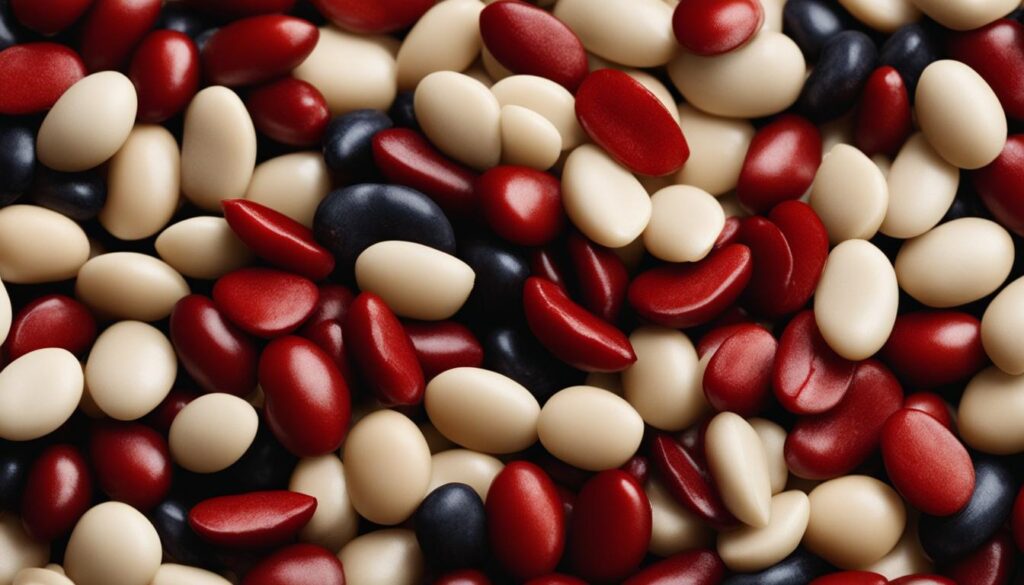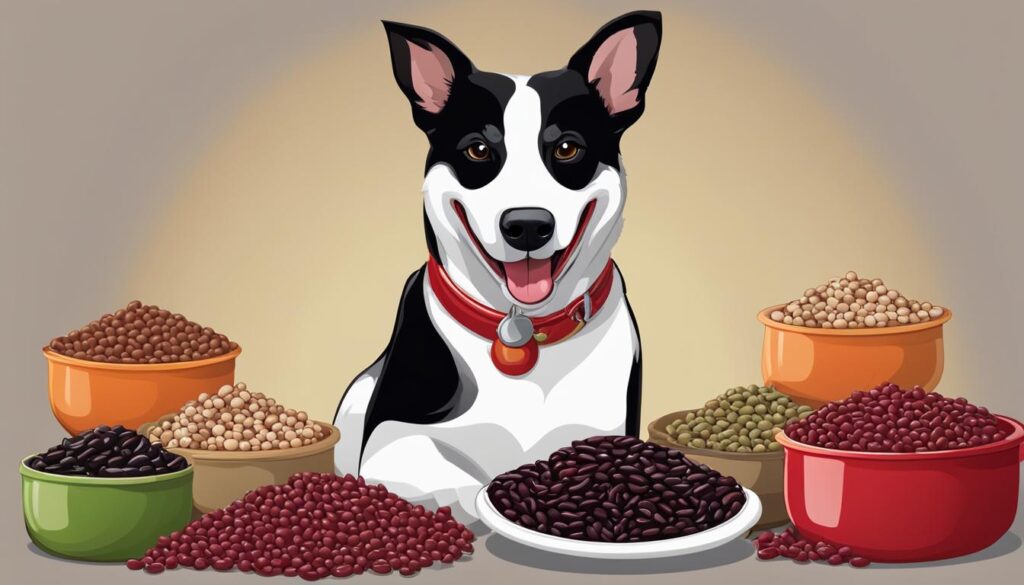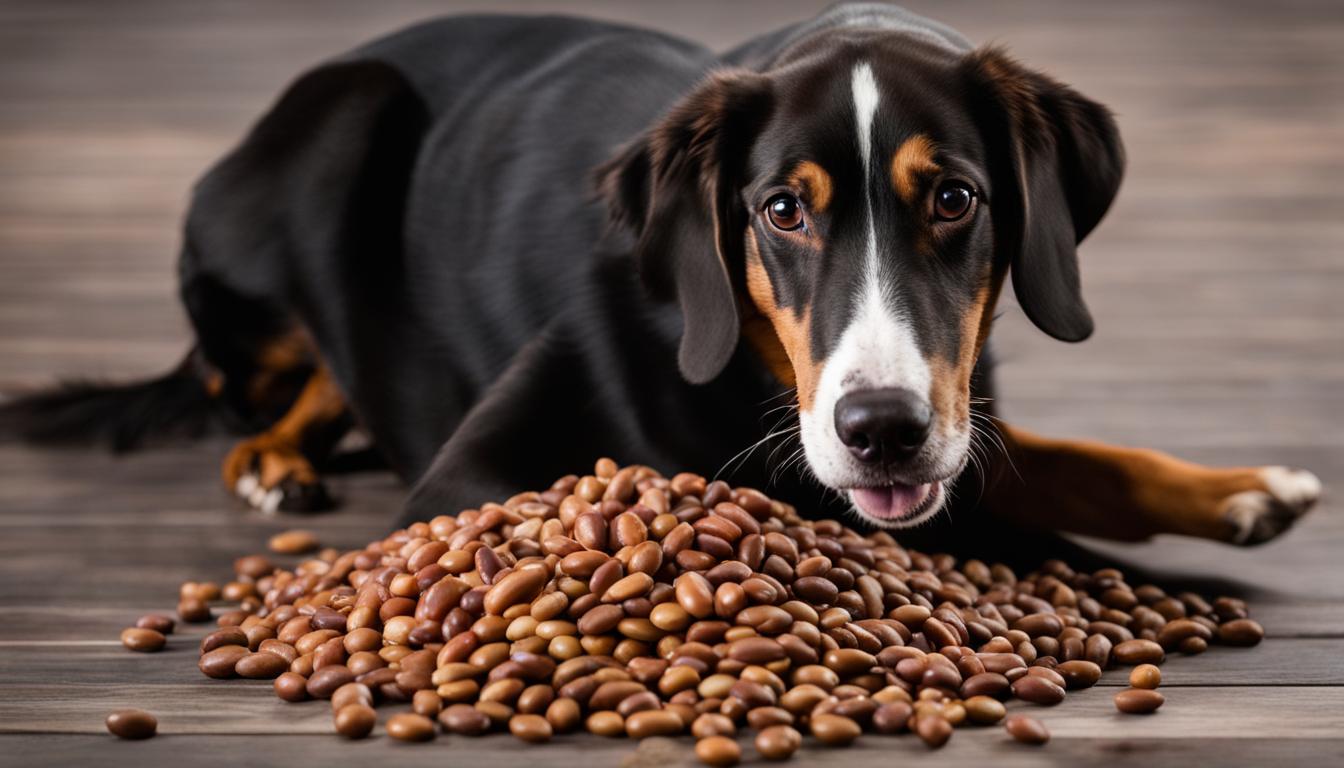Are you wondering if it’s safe to share your favorite beans with your furry friend? Well, you’re in luck! Dogs can indeed enjoy the tasty goodness of beans, and they can even bring some nutritional benefits to their diet. Let’s explore the world of dog-friendly beans and learn about their digestibility.
Key Takeaways:
- Dogs can safely consume a variety of beans, including black beans, lima beans, kidney beans, pinto beans, garbanzo beans, navy beans, edamame, and soybeans.
- Beans should not exceed 10% of a dog’s daily calorie intake.
- Properly preparing beans through soaking and cooking aids in digestion.
- Beans should not replace meat as the primary source of protein in a dog’s diet.
- Green beans, although not technically a bean, are a safe and healthy option for dogs.
Benefits of Beans for Dogs
Beans offer several health benefits for dogs. They are a good source of fiber, which aids in digestion and can help prevent constipation. Fiber also promotes a healthy gut microbiome in dogs, supporting overall digestive health. Additionally, beans provide dogs with protein, which is essential for muscle maintenance and the immune system. Protein is particularly important for active dogs or those recovering from injury or illness. Beans are also low in fat, making them a suitable option for dogs on weight management diets. Overall, the nutritional value of beans includes vitamins and minerals that contribute to a dog’s overall health and well-being.
“Beans are a fantastic addition to a dog’s diet due to their high fiber and protein content. They can aid in maintaining a healthy digestive system and promote muscle health in dogs. Plus, their low-fat content makes them an excellent choice for weight-conscious pups.”
Incorporating beans into a dog’s diet can be beneficial, but it is important to do so in moderation. Beans should make up only a small portion of a dog’s meal, typically less than 10%. They can be mixed into a dog’s regular food or used as a food topper if the dog enjoys them. However, it is crucial to monitor serving sizes and avoid overfeeding beans, as excessive consumption can lead to digestive issues such as gas or bloating. It is recommended to introduce beans gradually and observe any changes in the dog’s digestion or overall well-being. Consulting with a veterinarian is always a good idea before making any major changes to a dog’s diet.
| Bean Type | Health Benefits |
|---|---|
| Black Beans | High in fiber and protein |
| Lima Beans | Excellent source of dietary fiber and minerals |
| Kidney Beans | Rich in antioxidants and fiber |
| Pinto Beans | Good source of protein and essential nutrients |
| Garbanzo Beans (Chickpeas) | High in fiber and provide plant-based protein |
| Navy Beans | Contain essential vitamins and minerals |
Overall, incorporating beans into a dog’s diet, when done in moderation, can provide health benefits such as improved digestion, muscle maintenance, and essential nutrients. However, it is important to consult with a veterinarian before making any major changes to a dog’s diet and to monitor the dog’s response to the introduction of beans. With proper preparation and portion control, beans can be a nutritious and tasty addition to a dog’s meal.

Preparing Beans for Dogs
When it comes to incorporating beans into your dog’s diet, proper preparation is key. By soaking and cooking beans, you can ensure that they are easier to digest and minimize the risk of flatulence. Here’s how to prepare beans for your furry friend:
Soaking Beans:
Before cooking, it is recommended to soak beans overnight in water. This process helps to break down complex sugars and reduces the likelihood of gastrointestinal discomfort. Make sure to discard the soaking water and rinse the beans thoroughly before cooking.
Cooking Beans:
After soaking, cook the beans until they are soft and easily mashed with a fork. Avoid adding any seasonings, butters, or fats, as they may not be suitable for dogs. Plain, cooked beans are the best option. Remember to cool the beans completely before serving them to your dog.
By properly soaking and cooking beans, you can ensure that they are safe and digestible for your canine companion. It’s also important to note that while beans can be a nutritious addition to your dog’s diet, they should not replace meat as the primary source of protein. Always consult with your veterinarian about the appropriate amount of beans to include in your dog’s diet based on their specific needs.
Beans to Avoid for Dogs
While many beans can be a healthy addition to your dog’s diet, there are certain varieties that should be avoided. Here are the beans that are unsafe and toxic to dogs:
- Baked beans: These often contain seasonings, such as onions and garlic, that can be harmful to dogs.
- Refried beans: They are usually high in sodium and can cause digestive issues in dogs.
- Chili beans: The spices and seasonings used in chili can upset a dog’s stomach and may contain ingredients that are toxic to dogs.
It is crucial to check labels and avoid giving dogs any canned beans that contain salt brine or other additives.
Additionally, raw kidney beans should never be fed to dogs as they contain lectins, a substance that can be toxic to dogs. These beans must be cooked thoroughly before feeding to eliminate any potential harm.
| Unsafe Beans for Dogs | Reasons to Avoid |
|---|---|
| Baked beans | Contain seasonings harmful to dogs |
| Refried beans | High in sodium, can cause digestive issues |
| Chili beans | Spices and seasonings can upset a dog’s stomach, may contain toxic ingredients |
| Raw kidney beans | Contain toxic lectins, must be cooked thoroughly |
It’s important to prioritize your dog’s health and avoid feeding them any beans that could be harmful. Stick to safe varieties and always consult with your veterinarian if you have any concerns.
Remember:
“When it comes to beans, not all varieties are created equal for dogs. Be cautious and avoid giving your furry friend any unsafe beans.”

Allergies and Sensitivities to Beans in Dogs
Just like humans, dogs can develop allergies or sensitivities to certain foods, including beans. It’s important to recognize the signs of an allergic reaction or sensitivity to beans in your furry friend. Common symptoms may include changes in breathing, increased itchiness, swelling around the eyes or lips, upset stomach, and draining eyes. If you notice any of these symptoms, it’s recommended to consult your veterinarian for proper diagnosis and treatment.
While bean allergies in dogs are relatively rare, sensitivity to beans can occur. Some dogs may have difficulty digesting certain types of beans, leading to gastrointestinal discomfort. Others may experience mild allergic reactions that cause discomfort but are not life-threatening. It’s crucial to introduce new foods, including beans, gradually into your dog’s diet and closely monitor their response. If you suspect an allergy or sensitivity to beans, it’s best to avoid feeding them to your dog and explore other protein and fiber sources that are better tolerated.
“It’s important to recognize the signs of an allergic reaction or sensitivity to beans in your furry friend.”
| Allergies and Sensitivities to Beans in Dogs | Symptoms |
|---|---|
| Allergic Reactions | – Changes in breathing – Increased itchiness – Swelling around the eyes or lips – Upset stomach – Draining eyes |
| Sensitivity | – Difficulty digesting certain beans – Gastrointestinal discomfort |
Precautions for Feeding Beans to Dogs
When introducing beans into your dog’s diet, it’s important to exercise caution and take necessary precautions. Here are a few tips to keep in mind:
- Start with small quantities: Begin by offering your dog a small portion of cooked and properly prepared beans to assess their tolerance and response.
- Monitor for adverse reactions: Observe your dog closely after consuming beans, looking for any signs of discomfort or allergic reactions. If any symptoms are present, discontinue feeding beans immediately.
- Avoid seasoned or flavored beans: Opt for plain, unseasoned beans without any added spices, herbs, or sauces. These additives could potentially be harmful to your dog’s health.
- Gradual introduction: If your dog has never consumed beans before, introduce them gradually into their diet to allow their digestive system to adjust.
- Consult with your veterinarian: If you have any concerns or questions regarding feeding beans to your dog, it’s always best to consult with your veterinarian for personalized advice and guidance.
By following these precautions and paying attention to your dog’s individual needs, you can safely incorporate beans into their diet if they tolerate them well. However, always prioritize your dog’s well-being and consult with your veterinarian if you have any doubts or concerns.
Including Beans in a Dog’s Diet
If you’re considering incorporating beans into your dog’s diet, it’s important to do so in moderation and with careful consideration. Beans can be a healthy addition to a dog’s meal, providing fiber, protein, and other essential nutrients. However, it’s crucial to determine the appropriate serving size and properly prepare the beans to ensure optimal digestion and avoid potential digestive issues.
When incorporating beans into your dog’s diet, it’s recommended to start with a small amount and gradually increase the portion size over time. This allows your dog’s digestive system to adjust and helps prevent any gastrointestinal discomfort. Additionally, it’s important to monitor your dog’s response to the beans and watch for any adverse reactions.
One way to include beans in your dog’s diet is by mixing them directly into their regular food. This can add some variety and additional nutritional value to their meals. Another option is to use beans as a topper for their food. Simply adding a spoonful of cooked beans on top of their kibble can provide a boost of fiber and protein.
Benefits of Including Beans in a Dog’s Diet
Including beans in your dog’s diet can offer several benefits. Beans are a good source of fiber, which aids in digestion and can help prevent constipation. They also provide protein, which supports muscle maintenance and the immune system. Additionally, beans are low in fat, making them a suitable option for dogs on weight management diets.
| Bean Type | Protein Content | Fiber Content |
|---|---|---|
| Black Beans | 7.6g per 1/2 cup | 7.5g per 1/2 cup |
| Lima Beans | 6.8g per 1/2 cup | 6.6g per 1/2 cup |
| Pinto Beans | 7.7g per 1/2 cup | 7.7g per 1/2 cup |
Adding beans to your dog’s diet can provide them with valuable nutrients and help support their overall health. Just remember to introduce beans gradually and monitor their response. With the right approach, beans can be a nutritious and tasty addition to your furry friend’s meals!

Conclusion
Dogs and beans can make a great combination! The answer to the question “Can dogs eat beans?” is a resounding yes. There are several types of beans that are safe for dogs to consume, such as black beans, lima beans, kidney beans, pinto beans, garbanzo beans, navy beans, edamame, soybeans, and even green beans. These beans offer a range of potential health benefits for dogs, including fiber, protein, and essential nutrients.
When it comes to preparing beans for dogs, proper soaking and cooking are key. Soaking beans not only makes them easier to digest but also helps reduce the likelihood of flatulence. It is important to cook beans until they are soft and easily chewable, as raw or uncooked beans can pose a choking hazard. Remember to avoid adding any butters, fats, or seasonings when cooking beans for your furry friend.
While beans can be a nutritious addition to a dog’s diet, they should not replace meat as the primary source of protein. It is crucial to feed beans in moderation and monitor your dog for any adverse reactions. Some dogs may have allergies or sensitivities to certain beans, so introducing them gradually is recommended. By following these precautions and incorporating beans appropriately, you can provide your dog with a healthy and varied diet.
FAQ
Can dogs eat beans?
Yes, dogs can safely consume a variety of beans, including black beans, lima beans, kidney beans, pinto beans, garbanzo beans, navy beans, edamame, and soybeans.
What are the benefits of beans for dogs?
Beans offer several health benefits for dogs. They are a good source of fiber, which aids in digestion and can help prevent constipation. Beans also contain protein, which supports muscle maintenance and the immune system. Additionally, beans are low in fat, making them a suitable option for dogs on weight management diets.
How should I prepare beans for my dog?
Beans should be properly prepared through soaking and cooking. Soaking beans helps make them easier to digest and can reduce flatulence in dogs. It is important to cook beans until they are soft and easy to eat, as raw or uncooked beans can be difficult to digest and pose a choking hazard.
Are there any beans that I should avoid giving to my dog?
Baked beans, refried beans, and chili beans are not suitable for dogs due to the seasonings and potentially harmful ingredients used in their preparation. Canned beans that contain salt brine or other additives should also be avoided. Raw kidney beans can be toxic to dogs and should be cooked thoroughly before feeding. It is important to check labels and avoid giving dogs beans that are seasoned or contain harmful ingredients.
Can dogs be allergic or sensitive to beans?
Yes, like humans, dogs can have allergies or sensitivities to certain foods, including beans. It is important to introduce new treats gradually and monitor dogs for any negative reactions. If any symptoms of an allergic reaction occur, it is recommended to consult a veterinarian.
How much beans should I feed my dog?
Beans should make up a small portion of a dog’s meal, typically less than 10%. It is important to monitor serving sizes and feed beans in moderation to avoid potential digestive issues.
Can I mix beans into my dog’s regular food?
Yes, beans can be mixed into a dog’s regular food or used as a food topper if the dog enjoys them.





